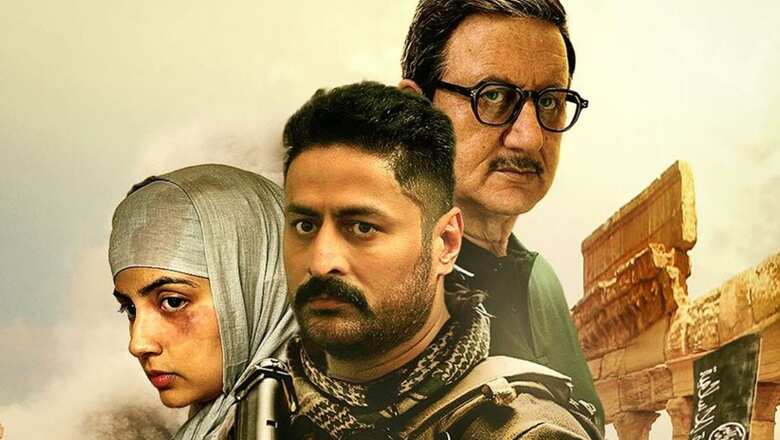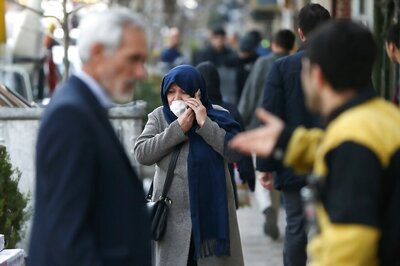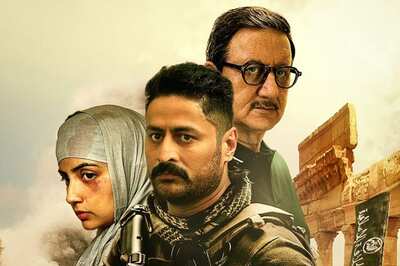
views
The depiction of Muslims in cinema and media has been a subject of significant discussion and concern. Historically, Muslims have often been depicted using harmful stereotypes, such as associating them with terrorism or religious extremism, which can perpetuate negative biases and contribute to Islamophobia or using the correct term, anti-Muslim bigotry or Muslim-phobia. (Islamophobia is a constructed term by Islamists to shut down critique and debates about regressive practices in Islam). There has been a lack of representation reflecting the diverse range of Muslim identities and experiences, meaning in many forms of media and entertainment, the portrayal of Muslims has often been one-dimensional and limited. The media has tended to focus on a narrow set of stereotypes or narratives about Muslims, failing to capture the rich diversity that exists within the Muslim community.
Arnold Schwarzenegger starring 1994 film ‘True Lies’ comes to mind which has one of the earliest depictions of Muslims as terrorists and misogynists only. Hollywood is known to be terribly biased in its neglect of portraying Muslims at the forefront of counter-terrorism and resistance to Islamism and Jihadism. It’s essential to acknowledge the multifaceted nature of this portrayal, which can vary widely based on particular media, creators, and context. In countries formerly colonised or under the influence of Marxist historians and post-modernist cultural relativism, the Islamic invasions and conquests, the Muslim Expansion project and various atrocities by Muslims never found space in literature, art, media, or cinema.
Now in the 21st century, as former colonies start renewing their cultures and histories and portraying their unheard, whitewashed, censored stories, it will become even more important to present brutal truths with facts, while making sure entire communities are not held responsible for historic wrongs.
Holocaust cinema has been able to do that excellently over the decades after World War 2, not demonising the entire German population while truthfully depicting the “banality of evil” in which ordinary citizens participated in barbaric crimes against humanity, fully conscious of the consequences of their actions. In India too, movies like ‘The Kashmir Files’, ‘The Kerala Story’ and various other films attempted to do this, some failing, some succeeding. Since the Indian film industry is also in the learning stages of making truthful cinema without censorships or bans, it will be a while before movies like ‘Schindler’s List’, ‘The Pianist’, ‘Suite Française’ or ‘The Boy in the White Pyjamas’ are made.
In recent years, there has been a concerted effort to promote more positive and nuanced portrayals of Muslims in the media. This includes showcasing Muslim characters in everyday roles, highlighting their contributions to society, and portraying their personal and professional achievements. Movies like ‘Gully Boy’, ‘Haider’, ‘My Name is Khan’, ‘Mulk’ and ‘Raazi’ come to mind. Some creators have actively worked to challenge stereotypes and provide counter-narratives that humanise Muslims, emphasising their shared humanity and struggles. The latest is the OTT series ‘The Freelancer’, where a Muslim female protagonist, a victim of an ISIS-radicalised family fights, to escape from their clutches.
OTT platforms have revolutionised creative expression by providing artists, creators, freelancers, and those facing censorship with unprecedented opportunities. These platforms offer global reach and freedom from traditional media censorship, allowing creators to connect with diverse global audiences and express themselves freely. The diversity of content, multiple monetisation models, creative control, and access to valuable audience data empower creators to explore unconventional ideas, generate income directly from their work, and build authentic, artistically driven projects. The adaptation of Shirish Thorat’s book ‘A Ticket to Syria’, by Neeraj Pandey, is a refreshing take on some true stories about ISIS recruiting Indian men and women.
In ‘The Freelancer’, Avinash Kamath, an ex-cop turned mercenary, played by Mohit Raina takes up the daunting task of rescuing Aliya, a newly married girl trapped in war-torn Syria, played by Kashmira Pardeshi, against the backdrop of growing ISIS terrorism. Thorat, a former Goa Police officer with a decade of service, pursued further studies at the Royal Military College in the UK. Following a stint in the Middle East aviation industry, he returned to India where he became a consultant and subject matter expert in security, risk management, and innovative software applications for law enforcement agencies. Shirish is highly regarded for his expertise in counter-terrorism, money laundering, and risk mitigation.
Media outlets, creators, and producers bear an ethical responsibility to ensure that their portrayals are fair, accurate, and sensitive to the diversity within the Muslim community. This responsibility extends to not only the characters on screen but also to those involved in the creation and production of content. Ordinary Muslims are victims of radical political Islam too. The way Muslims are depicted in media can significantly influence public opinion and policy, with negative portrayals contributing to discrimination, bias, and even hate crimes.
Various sites documenting Indian cinema over the years have started filing the negative portrayals of upper caste Hindu Brahmins as villains, torturers, and usurpers while the Muslim characters never seem to rise above the ranks of peons, guards, police officers, chefs, house help, and butlers. Cinematic representations can be tricky when it comes to depicting what occurred and who was responsible while working to not portray everyone’s story as a commentary of an entire community. Positive and empathetic representations can help foster understanding and tolerance.
Indian cinema reflects the diversity of the country, and characters from different religious backgrounds are often depicted as integral parts of the storytelling. While progress has been made, there remain challenges in combating harmful stereotypes of Hindus, Muslims, Sikhs, Christians, and Northeast people in a land as diverse as India and ensuring more authentic representation. Some media still rely on outdated and detrimental tropes, emphasising the need for continued efforts to promote fair and diverse portrayals in cinema and media.
In recent years, there has been a growing awareness of the need for more accurate and diverse representations of Muslims in media, acknowledging the various identities and experiences within the community. This includes telling stories that reflect the rich tapestry of Muslim life and highlighting the contributions and challenges of Muslims from all walks of life. By doing so, media can help break down stereotypes and promote a more nuanced and inclusive understanding of the Muslim community.
The author is a writer and an educationist from Srinagar, Kashmir. Views expressed in the above piece are personal and solely that of the author. They do not necessarily reflect News18’s views.



















Comments
0 comment